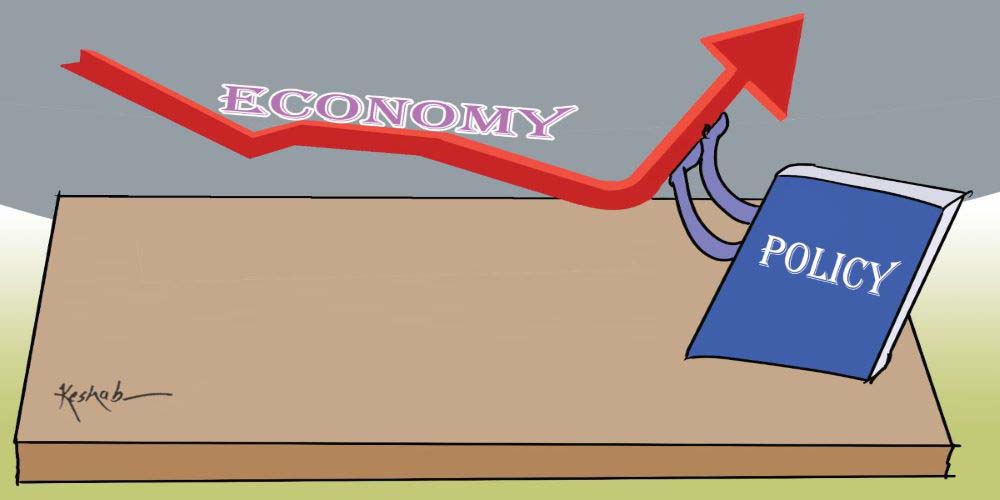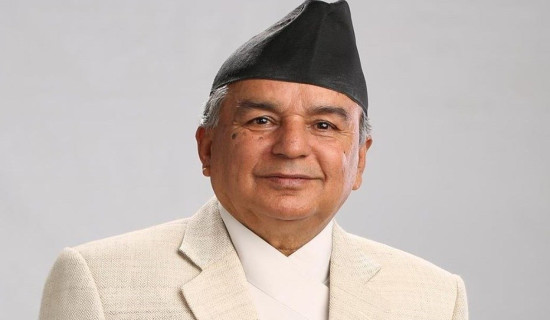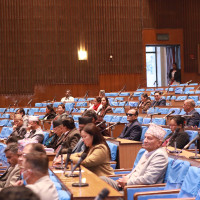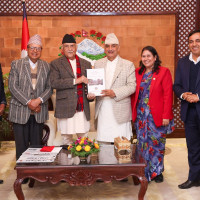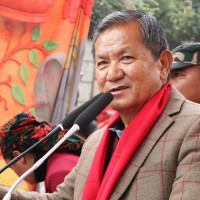- Wednesday, 19 February 2025
Caution called for turning economy around
By Laxman Kafle, Kathmandu, Jan. 1: The economy of the country has been at a crossroads for the past several months. Its health has deteriorated over the months because of both internal and external pressures. The country experienced its first revenue deficit this fiscal year, collection of revenue failed to be at par with the target while development activities have been slowed resulting in poor capital expenditure. Likewise, inflation has exceeded 8 per cent, and the interest on loans has reached at least 14 per cent.
Internal, and external sector pressures
Economists have argued that Nepal is now passing through a challenging situation in terms of revenue collection and other internal and external sectors of the economy. Economist Keshav Acharya said that the new Finance Minister should make the economic move very carefully to cope with the challenges facing the country's economy. Obviously, the government is under financial pressure as the revenue is not enough to cover even the recurrent expenditure. There has been a significant decrease in both customs and internal revenue. As a result, a situation has arrived in which the country has to borrow to manage general expenses.
According to the data of the Financial Comptroller General Office, revenue collection of the government stood at Rs. 350.8 billion against recurrent expenditure of Rs. 393.1 billion as of December 30, 2022. The latest report of Nepal Rastra Bank also showed the current account deficit at Rs. 35.40 billion in the first five months of the current fiscal year. However, an improvement has, of late, been witnessed in the balance of payments, remittance inflows and foreign currency reserves.
The country imported heavily towards the end of the fiscal year 2021/22, which resulted in a deficit of balance of payments and a sharp decline in the foreign exchange reserves, with some economists suspecting where Nepal was likely to go Sri Lanka’s way.
But the government adopted import control measures in April, imposing a ban on the imports of various goods, including vehicles, liquors, and expensive mobile and television sets. This measure worked, and the foreign exchange reserves improved and reached Rs. 1,246.27 billion in mid-November 2022. Increment in the remittance inflows also contributed to the improvement in foreign currency reserves and balance of payments.
When the economy was slowly recovering from the effects of the COVID-19 pandemic, it was again marred by the Russian invasion of Ukraine in February last year. The Russia-Ukraine war disturbed the supply chain leading to inflation across the globe. As an import-based economy, Nepal was also hit hard by the war.
In the meantime, the contraction in demand, high interest rates and lack of investable capital greatly worried the businessmen prompting them to launch demonstrations against interest rate hikes, working capital loans guidelines implemented by the central bank and the problem of loanable funds.
After the formation of the new government under CPN-Maoist Centre Chairman Pushpa Kamal Dahal ‘Prachanda’, the anxious businessmen have met the PM and Deputy Prime Minister and Finance Minister Bishnu Paudel and Deputy Prime Minister and Home Minister Rabi Lamichhane to draw their attention to the problems facing the economy. The first priority of the new government should be revenue collection, said former finance secretary Rameshore Khanal.
"There is no chance to cut expenditure at a time when the private sector is unable to increase investment. So, in this situation, the government should expand expenses," he said.
Because of the weakened system of the Ministry of Finance, there has been a decrease in revenue collection even though there is a high potential, he said. "The revenue collection must be improved immediately after making ministerial administration sound and controlling leakage," he said, adding that the new Finance Minister should focus on it first.
Around Rs. 130 billion revenues were lost due to a weak system in revenue collection, Khanal said. He stressed the need for expediting development works and facilitating completion of ongoing projects, including foreign-aid projects to ease the liquidity in the market.
Lifting import ban suicidal
Economist Acharya said that the government's decision to lift ban on imports at a time when the economy is still facing external pressure was suicidal.
"The government has decided to lift the ban on imports only with the thought of increasing customs revenue without considering the external sector problem, which is wrong. I suspect a sustained improvement in the external sector in the coming days after the lifting of the ban imposed on imports by the government," he said. The previous government had lifted the ban effective from December 16, 2022.
"Reforming the external sector will disrupt the internal economy and adjusting the internal economy will put pressure on the external sector, so the government should take careful moves to overcome the challenges," Acharya said.
He said that the government should not take any policy only to please the private sector by addressing their problems without analysing the external sector pressure on the economy.
Acharya said, "Even though the government and the private sector are experiencing economic losses, it is time to protect the country's economy first. Therefore, the government should take the private sector into confidence with the assurance that it will support the private sector once the economy turns around."
Reduction of interest rate not remedy
"At present, the private sector is arguing that they are facing problems due to reduced economic activity. This is not due to systemic problems. Those who are agitating may have problems because they have taken loans haphazardly and invested in non-productive sectors. It is their personal problem, not of all the businessmen," Khanal said.
The private sector has said that in order to boost the morale of industrialists, the interest rate should be reduced immediately, and if the working capital loan guidelines can be postponed for two years, then a positive message will be disseminated immediately and the industrialists will be encouraged.
"When some businessmen are in financial trouble due to their own doing, the state and common citizens cannot bear the burden of their wrongdoings. If there is an economic crisis in the country like the problems invited by earthquake, coronavirus and economic blockade, the government should introduce a stimulus package and solve the problems," said Khanal.
But it was not that case this time and the government should not bring a stimulus package to solve the financial crisis targeting specific business groups, he claimed. Instead, the government can ask the businessmen to present the details of their loan and investment. If they are in a real crisis even by making proper use of the loans, the government should address their problems, he said.
"There is over-lending in the market. Nepal is the country with the highest credit and money supply in South Asia. We have sent more money to the market than the value of the goods and services we have produced throughout the year," he said.
If the interest rate is reduced by the market process, it is fine, but the NRB should not reduce the interest rate by printing notes and supplying money to the market, Khanal said.
Govt. assures resolving problems
During a meeting with the businessmen, the Prime Minister has also told them that the revival of the country's economy was his first priority.
DPM Paudel has promised not only to increase the confidence of the private sector, but has already begun initiatives to solve the problem from the Council of Ministers. The Cabinet meeting recently decided to make the economy dynamic by addressing liquidity problems, high interest rates, pressure on foreign currency reserves and decline in the capital market through the harmonious implementation of fiscal and monetary policies. DPM Paudel has said that even though the country's economy has reached a critical state, it has not gone out of control.
Ray of hope
With the formation of the new government, the private sector has expected that the economic development of the country will accelerate and employment opportunities will increase in the country. Senior Vice-President of Nepal Chamber of Commerce Kamalesh Agrawal believed that the new government would solve the problems faced by the private sector and create a business-friendly environment.
"Due to the effect of COVID-19, the working capital of the private sector has been lost by 20 per cent. It was worsened further after the prices of goods skyrocketed because of the Russia-Ukraine war that disturbed the supply chain, and the devaluation of Nepali rupees against the US dollar," he said. DPM Paudel has taken the request made by the private sector positively to raise the declining morale of industrialists and adopt a policy to revive the economy which is in a challenging situation, he said.
After the DPM assured to resolve the problems of the private sector soon, agitating businessmen have postponed their protest programme for now.
With the formation of the new government, there has been a significant increase in the NEPSE index too, which is a positive sign in the stock market.

